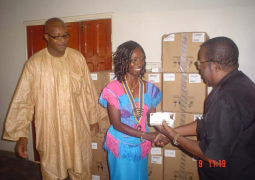The project, which seeks to promote adaption measures to combat negative impacts of climate change, will be addressed with the active participation and involvement of the communities.
The governor of North Bank Region has underscored government’s commitment to the protection and preservation of forest and Natural Resources Consulting (NACO) to bring about sustainable development and poverty reduction.
Lamin Queen Jammeh was speaking on Tuesday in Kerewan at a two-day validation workshop on diagnostic studies and a project proposal for Community-Based Sustainable Land Management and climate change adaption.
He said promoting sustainable land management and climate change adaptation would contribute to increase production and productivity.
Governor Jammeh hailed the effort of Natural Resource Consulting and CILSS in complementing government efforts in enhancing sustainable land management and forest resources in North Bank Region.
He affirmed the region’s willingness to ensure effective management of the meagre forest resources to boost food security and socio-economic development.
Abdoulie A. Danso, deputy Permanent Secretary and contact person for CILSS, lauded NACO and CILSS for the foresight and commitment, noting that sustainable land management has the potential to contribute to poverty reduction and sustainable development.
Sustainable land management cannot be achieved without holistic landscape management approach which calls for diversification in food production, he said.
He added that land resources are among the most productive ecosystem with unique environmental and economic benefit to man for sustainable development.
DPS Danso asserted that unsustainable exploitation of resources are a result of poor farming practices, forest tree exploitation, fuel wood, depletion of soil fertility, deforestation, barren land and desert line condition.
He said that since the inception of CILSS 40 years ago, numerous interventions have been undertaken to complement government’s development aspirations in food security and environmental protection.
Deputising for the Forestry Director, head of Participatory Forest Management at the department of forestry, Cherno Gaye, noted that forestry is mandated to properly manage the country’s natural resources, noting that the ministry attaches great importance to tree planting, such as planting one million trees annually.
He thanked CILSS for funding the consultancy and implementation of community sustainable land management and climate change adaption. He used the occasion to call on the people of NBR to successfully implement the project, noting that the design of the project is in line with the country’s decentralization process.
Kanimang Camara, Director of Natural Resource Consulting at NACO, applauded the communities and local authorities for their support to his agency in data collection on diagnostics studies and also to the formulation of project proposal on sustainable land management.
He said the study has greatly contributed to the drafting of the finding, which values community participation and ownership towards the successful implementation of the project.
The NACO boss hailed the support of CILSS in commissioning the study.
In a PowerPoint presentation on the Community-Based Sustainable Land Management, it was stipulated that the project will enhance the skills and knowledge to soundly manage natural resources and conserve the remaining biodiversity.
He pointed out that community forest management capacities at local level will be strengthened to promote community-based forest enterprise development, as well as initiate and strengthen 15 community forest villages in the region through development and implementation of climate resilience and sustainable enterprise development plans.
Dr Edwige Botoni Suzane Kabore, expert in Rural Development of CILSS Executive Secretariat in Ouagadougou, Burkina Faso, expressed delight at the high-level participation in the validation and review of the project proposal.
The project will be piloted in NBR for 2 years with initial capital of 300,000 Euros. The officials will partner with institutions and NGOs to accelerate sustainable meaningful development.
However the project would contribute to promoting public awareness on effective sustainable land management and climate change adaption.
The Senior Policy Analyst at the Office of the President has underscored that government is much concerned with combating desertification and enhance sustainable land management and climate change adaption.Malang Jatta also spoke at the end of the two-day validation workshop.
He thanked CILSS for complementing government’s development aspiration, saying the implementation of sustainable land management project in NBR would promote forestation and effective sustainable land management.
Mr Jatta called on the people in the region to be proactive to build ownership and plant trees, adding that it would boost food production and nutritional development.
Ebou Janha, Regional Forestry Officer, lauded the efforts of farmers for their contribution and support throughout the consultation period.


